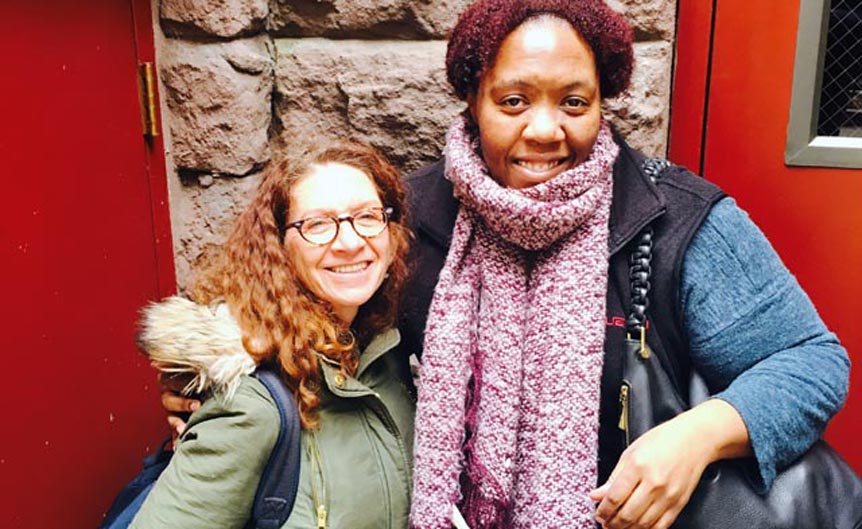In Japanese tradition, Suzaku, a mythological spirit creature, protects the region. Suzaku has a superpower; the elegant and noble bird has the ability to rise again and be reborn like a phoenix.
I have spent a lot of my life allowing myself to be metaphorically destroyed by the attitudes of other people. I am not just Black, just Jewish, or just Japanese, I am Black, Jewish and Japanese! This past year, as exhausting as it has been, has enabled me to shape my intersectional and idiosyncratic identity into a superpower.
I have been forced by society to choose bits and pieces of myself, and leave others at the door. I do not seem to fit into any generally accepted category. I’m so tired of being asked, “What are you?” Mostly I have answered that question by shrinking into myself and staying silent. My relationship with my overall identity has been a rather lonely journey of self-discovery.
Throughout my life I have wanted to blend in and belong. But I get asked uncomfortable questions. In Jewish spaces, people assume I was adopted or that I am a convert. I don’t mind questions that are part of the normal getting-to-know-you process, but some questions are probing and deeply personal. Many of these questions make me feel othered. And so while I was eager to involve myself and my kids in our community—the Jewish community—I was forced to protect them from some of the people in that very community who I knew would make them feel like outsiders.
To complicate things even more, I also have dealt with colorism from Black and Asian communities. I’m seen as too Japanese to be Black, and too Black to be Japanese.
Growing up in Japan, I received a lot of scrutiny from family and friends about my skin color. They were always concerned about me getting too dark. At times, I’ve even been excluded from events and activities in the Asian community because someone else made the decision for me that I would feel uncomfortable being the only Black Asian in the group. They were projecting their discomfort with my blackness onto me.
When I went to college in the United States, I experienced the same scrutiny but for a different reason among my Black peers. To them I was “high yellow,” and they questioned my blackness because of my lighter shade. I felt that I would receive even more scrutiny about my identity if I told them I was also Jewish. Somehow the assumption that others made about the intersections of my identity was that they are in conflict with each other and limited my understanding of each community’s historical and contemporary oppression and culture.
This past year, as exhausting as it has been, has enabled me to shape my intersectional and idiosyncratic identity into a superpower.
The recent white supremacist violence against Asian Americans in Atlanta, and the anti-Asian violence across the country more generally, reminds me that who I am, and that the communities to which I belong, have always been targets of hatred and violence. Seeing how Atlanta police officials defended the murder of six Asian women by saying he’d had “a bad day” is a disturbing, double standard of “justice.” But millions of Americans standing in solidarity, demanding an end to America’s love affair with racism and bigotry has given new energy to the legacy of the Civil Rights movement and gives me hope for the future. However, witnessing white terrorism with little consequence has been personally exhausting.
We are exhausted (yes, I said it again). The double standards in our justice system overwhelm communities of color with anger, exasperation, and complex post-traumatic stress disorder and emotional numbness. This cycle is a recurring theme in our society, institutions, and judicial system, all of which need radical reform.
With the rise of hate crimes against Black people, Jews, and Asians in America, it is more important than ever that we love each other, love ourselves, and stop creating false narratives for others based on our own assumptions. Although these past weeks and this past year leave me somewhat depleted … okay a lot depleted … the silver lining of this pandemic is that it has turned attention onto something so much greater than anything else:… our collective humanity.
Recently I have felt a rebirth of my spirit. Being different makes you stronger because you don’t have a choice of stripping yourself of who you are. I was born with my DNA, my beautiful toffee skin, my almond brown eyes, my samurai power, all driven by my Jewish neshama.
I feel the reverberations of this revolution deeply within myself. I have finally been able to combine all the identities I hold and show up as a powerful, confident Black-Jewish-Japanese human and woman. I have become unyielding, unwavering in my identity in a society that is quick to label you with its assumptions. I have transformed wholly on the level of self-love and acceptance of who I am and how I show up fully in the world.
Just as Wonder Woman has three parts to her identity—Wonder Woman, Amazonian Princess Diana, and Diana Prince—and all three are part and parcel of one powerful woman, I, too, have three parts to my identity—Black, Japanese, and Jewish—which make up one powerful woman: me.
That is my superpower. Like Suzaku, the vermilion bird of the south, no matter how exhausting and defeating racial justice work can be, like the phoenix I too shall rise.
Please visit our Uplifting Asian Jewish Voices page for more information.







